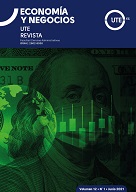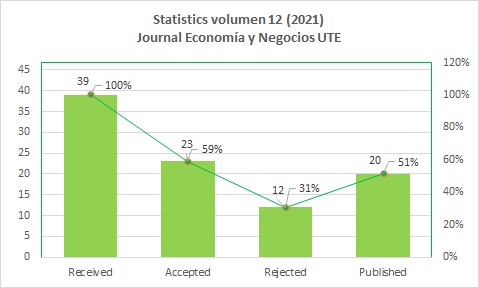Nexo agua-energía-alimentos: rentabilidad y riesgo en portafolio de inversión escenario postpandemia
DOI:
https://doi.org/10.29019/eyn.v15i2.1349Keywords:
Nexus, Water, Food, Energy, Commodities, Efficiency FrontierAbstract
The primary objective of this study was to evaluate the profitability and risks associated with the Water-Energy-Food (WEF) nexus portfolio in the post-pandemic scenario. For this purpose, a quantitative and cross-sectional methodology was employed, based on the analysis of a variety of commodities representing these sectors, such as California water bonds, Brent crude oil, natural gas, corn, soy, and coffee. The analysis was conducted using a Python-developed algorithm, focused on assessing the portfolio's profitability, risk, and Markowitz's Efficient Frontier. The results indicate that, although there are profitability opportunities in the WEF nexus portfolio, significant risks are also present for achieving such profitability. A key finding of the study is that, despite the increasing demand for efficient and sustainable resources, investment in these sectors requires strategic and considered management. The need for careful portfolio selection and diversification is suggested, aligning investments with sustainability principles to ensure their long-term viability. The study concludes by highlighting the importance of developing more robust predictive models and advocates for future research for a more comprehensive analysis of the dynamics between water, energy, and food and their impact on financial markets.
Downloads
References
Al-Saidi, M. y Elagib, N. A. (2017). Towards unders- tanding the integrative approach of the wa- ter, energy and food nexus. Science of The Total Environment, 574, 1131-1139. https:// doi.org/10.1016/j.scitotenv.2016.09.046
Al-Saidi, M. y Hussein, H. (2021). The water-energy- food nexus and COVID-19: Towards a sys- tematization of impacts and responses. Science of The Total Environment, 779, 146529. https://doi.org/10.1016/j.scitot- env.2021.146529
Avila-Castañeda, G. I., Otazo-Sánchez, E. M., Ro- mán-Gutiérrez, A. D. y Acevedo-Sandoval, O. A. (2023). ¿Qué es el nexo agua-energía- alimentos? Pädi Boletín Científico de Cien- cias Básicas e Ingenierías del ICBI, 10(20), Article 20. https://doi.org/10.29057/icbi. v10i20.10135
Bazilian, M., Rogner, H., Howells, M., Hermann, S., Arent, D., Gielen, D., Steduto, P., Mueller, A., Komor, P., Tol, R. S. J. y Yumkella, K. K. (2011). Considering the energy, water and food nexus: Towards an integrated modelling ap- proach. Energy Policy, 39(12), 7896-7906. https://doi.org/10.1016/j.enpol.2011.09.039
Benson, D., Gain, A. y Rouillard, J. (2015). Water Governance in a Comparative Perspective: From IWRM to a «Nexus» Approach? Water Alternatives, 8, 756-773.
Cairns, R. y Krzywoszynska, A. (2016). Anatomy of a buzzword: The emergence of ‘the water- energy-food nexus’ in UK natural resource debates. Environmental Science & Policy, 64, 164-170. https://doi.org/10.1016/j.en- vsci.2016.07.007
Calder, R. S. D., Grady, C., Jeuland, M., Kirchhoff, C. J., Hale, R. L. y Muenich, R. L. (2021). COVID-19 Reveals Vulnerabilities of the Food–Ener- gy–Water Nexus to Viral Pandemics. Envi- ronmental Science & Technology Letters, 8(8), 606-615. https://doi.org/10.1021/acs. estlett.1c00291
Chen, D., Zhang, P., Luo, Z., Zhang, D., Bi, B., y Cao, X. (2019). Recent Progress on the Water–Ener- gy–Food Nexus using Bibliometric Analy- sis. Current Science, 117, 577. https://doi. org/10.18520/cs/v117/i4/577-586
Chen, S.-T., Kuo, H.-I., y Chen, C.-C. (2010). Modeling the relationship between the oil price and global food prices. Applied Energy, 87(8), 2517-2525. https://doi.org/10.1016/j.ape- nergy.2010.02.020
Cheng, Y., Liu, H., Wang, S., Cui, X. y Li, Q. (2021). Global action on sdgs: Policy review and
outlook in a post-pandemic era. Sustaina- bility (Switzerland), 13(11). Scopus. https:// doi.org/10.3390/su13116461
De Laurentiis, V., Hunt, D. y Rogers, C. (2016). Over- coming Food Security Challenges within an Energy/Water/Food Nexus (EWFN) Approach. Sustainability, 8. https://doi. org/10.3390/su8010095
Du, X., Yu, C. L., y Hayes, D. J. (2011). Speculation and volatility spillover in the crude oil and agricultural commodity markets: A Baye- sian analysis. Energy Economics, 33(3), 497-503. https://doi.org/10.1016/j.ene- co.2010.12.015
Endo, A., Tsurita, I., Burnett, K. y Orencio, P. M. (2017). A review of the current state of research on the water, energy, and food nexus. Journal of Hydrology: Regional Studies, 11, 20-30. https://doi.org/10.1016/j.ejrh.2015.11.010
Fang, Y., Lai, K. K. y Wang, S. (2008). Fuzzy Portfolio Optimization. Springer Berlin.
FAO y WFP. 2020. FAO-WFP early warning analysis of acute food insecurity hotspots, Rome. En: https://acortar.link/B7nNcT (2020), Acceso 12 de enero 2024.
FAO. 2013. Afrontar la escasez de agua. Un marco de acción para la agricultura y la seguridad alimentaria. Roma, FAO. https://acortar. link/5AxHzU Acceso 12 de enero 2024
FAO. 2014. The Water-Energy-Food Nexus A New Approach in Support of Food Security and Sustainable Agriculture. https://acortar. link/yRyzkw Acceso 12 de enero 2024
FAO. 2020. El estado mundial de la agricultura y la alimentación 2020: Superar los desafíos relacionados con el agua en la agricultura. FAO. https://doi.org/10.4060/cb1447es
Farid, S., Naeem, M. A., Paltrinieri, A. y Nepal, R. (2022). Impact of COVID-19 on the quan- tile connectedness between energy, me- tals and agriculture commodities. Ener- gy Economics, 109, 105962. https://doi. org/10.1016/j.eneco.2022.105962
Gardebroek, C. y Hernández, M. A. (2013). Do energy prices stimulate food price volatility? Exami- ning volatility transmission between US oil, ethanol and corn markets. Energy Econo- mics, 40, 119-129. https://doi.org/10.1016/j. eneco.2013.06.013
Gonçalves, G., Wanke, P. y Tan, Y. (2022). A higher order portfolio optimization model incorpo- rating information entropy. Intelligent Sys- tems with Applications 15, 200101. https:// doi.org/10.1016/j.iswa.2022.200101
Le, T. H., Pham, L. y Do, H. X. (2023). Price risk transmissions in the water-energy-food nexus: Impacts of climate risks and port- folio implications. Energy Economics, 124, 106787. https://doi.org/10.1016/j.ene- co.2023.106787
Li, G., Wang, Y. y Li, Y. (2019). Synergies within the Water-Energy-Food Nexus to Support the Integrated Urban Resources Governance. Water, 11, 2365. https://doi.org/10.3390/ w11112365
Liu, J., Mao, G., Hoekstra, A. Y., Wang, H., Wang, J., Zheng, C., Vliet, M. T. H. van, Wu, M., Ruddell, B. y Yan, J. (2018). Managing the energy-wa- ter-food nexus for sustainable development. Applied Energy, 210, 377-381. https://doi. org/10.1016/j.apenergy.2017.10.064
Moreschi, L., Gagliano, E., Gallo, M. y Del Borghi, A. (2024). A framework for the environmental assessment of water-energy-food-climate nexus of crops: Development of a compre- hensive decision support indicator. Ecolo- gical Indicators, 158, 111574. https://doi. org/10.1016/j.ecolind.2024.111574
Naeem, M. A., Karim, S., Hasan, M., Lucey, B. M. y Kang, S. H. (2022). Nexus between oil shocks and agriculture commodities: Evi- dence from time and frequency domain. Energy Economics, 112, 106148. https://doi. org/10.1016/j.eneco.2022.106148
Nazlioglu, S. y Soytas, U. (2011). World oil prices and agricultural commodity prices: Evi- dence from an emerging market. Energy Economics, 33(3), 488-496. https://doi. org/10.1016/j.eneco.2010.11.012
Nazlioglu, S., Erdem, C. y Soytas, U. (2013). Vola- tility spillover between oil and agricultural commodity markets. Energy Economics, 36, 658-665. https://doi.org/10.1016/j. eneco.2012.11.009
Nicola, F. de, De Pace, P. y Hernández, M. A. (2016). Co-movement of major energy, agricultu- ral, and food commodity price returns: A time-series assessment. Energy Econo-
mics, 57, 28-41. https://doi.org/10.1016/j.
eneco.2016.04.012
Pahl-Wostl, C. (2019). Governance of the water- energy-food security nexus: A multi-level coordination challenge. Environmental Science & Policy, 92, 356-367. https://doi. org/10.1016/j.envsci.2017.07.017
Serra, T. (2011). Volatility spillovers between food and energy markets: A semiparame- tric approach. Energy Economics, 33(6), 1155-1164. https://doi.org/10.1016/j.ene- co.2011.04.003
Shahzad, S. J. H., Hernandez, J. A., Al-Yahyaee, K. H. y Jammazi, R. (2018). Asymmetric risk spillo- vers between oil and agricultural commo- dities. Energy Policy, 118, 182-198. https:// doi.org/10.1016/j.enpol.2018.03.074
Simpson, G. B. y Jewitt, G. P. (2019a). The water- energy-food nexus in the anthropocene: Mo- ving from ‘nexus thinking’ to ‘nexus action’. Current Opinion in Environmental Sustaina- bility, 40, 117-123. https://doi.org/10.1016/j. cosust.2019.10.007
Simpson, G. B. y Jewitt, G. P. W. (2019b). The Deve- lopment of the Water-Energy-Food Nexus as a Framework for Achieving Resource Se- curity: A Review. Frontiers in Environmental Science, 7. https://www.frontiersin.org/ar- ticles/10.3389/fenvs.2019.00008
Simpson, G., Jewitt, G., Becker, W., Badenhorst, J., Masia, S., Neves, A. R., Rovira, P. y Pascual, V. (2022). The Water-Energy-Food Nexus Index: A Tool to Support Integrated Resou- rce Planning, Management and Security. Frontiers in Water, 4, 825854. https://doi. org/10.3389/frwa.2022.825854
Spang, E. S., Moomaw, W. R., Gallagher, K. S., Kir- shen, P. H. y Marks, D. H. (2014). The wa- ter consumption of energy production: An international comparison. Environmental Research Letters, 9(10), 105002. https:// doi.org/10.1088/1748-9326/9/10/105002
Teotónio, C., Rodríguez, M., Roebeling, P. y For- tes, P. (2020). Water competition through the ‘water-energy’ nexus: Assessing the economic impacts of climate change in a Mediterranean context. Energy Economics, 85, 104539. https://doi.org/10.1016/j.ene- co.2019.104539
Wang, J., Ju, K. y Wei, X. (2022). Where Will ‘Water- Energy-Food’ Research Go Next?—Visualisa- tion Review and Prospect. Sustainability, 14, 7751. https://doi.org/10.3390/su14137751
Weller, J. (2020). La pandemia del COVID-19 y su efecto en las tendencias de los mer- cados laborales. https://hdl.handle. net/11362/45759
Yin, C., Pereira, P., Hua, T., Liu, Y. y Zhu, J. (2022). Recover the food-energy-water nexus from COVID-19 under SDG acceleration actions. Science of The Total Environment, 817,
https://doi.org/10.1016/j.scitot-
env.2022.153013
Yip, P. S., Brooks, R., Do, H. X. y Nguyen, D. K. (2020). Dynamic volatility spillover effects between oil and agricultural products. International Review of Financial Analysis, 69, 101465. https://doi.org/10.1016/j.irfa.2020.101465
Zhang, C., Chen, X., Li, Y., Ding, W. y Fu, G. (2018). Water-energy-food nexus: Concepts, ques- tions and methodologies. Journal of Clea- ner Production, 195, 625-639. https://doi. org/10.1016/j.jclepro.2018.05.194
Published
How to Cite
Issue
Section
Categories
License
Copyright (c) 2024 The Authors

This work is licensed under a Creative Commons Attribution 4.0 International License.
The articles and research published by the UTE University are carried out under the Open Access regime in electronic format. By submitting an article to any of the scientific journals of the UTE University, the author or authors accept these conditions.
The UTE applies the Creative Commons Attribution (CC-BY) license to articles in its scientific journals. Under this open access license, as an author you agree that anyone may reuse your article in whole or in part for any purpose, free of charge, including commercial purposes. Anyone can copy, distribute or reuse the content as long as the author and original source are correctly cited. This facilitates freedom of reuse and also ensures that content can be extracted without barriers for research needs.
Creative Commons Attribution 4.0 International License
The Journal Economía y Negocios is distributed under a
Creative Commons Attribution 4.0 International (CC BY 4.0).

In addition, the journal Economía y Negocios guarantees and declares that authors always retain all copyrights to the original published works without restrictions [© The Author(s)]. Acknowledgment (BY): Any exploitation of the work is allowed, including a commercial purpose, as well as the creation of derivative works, the distribution of which is also allowed without any restriction.















